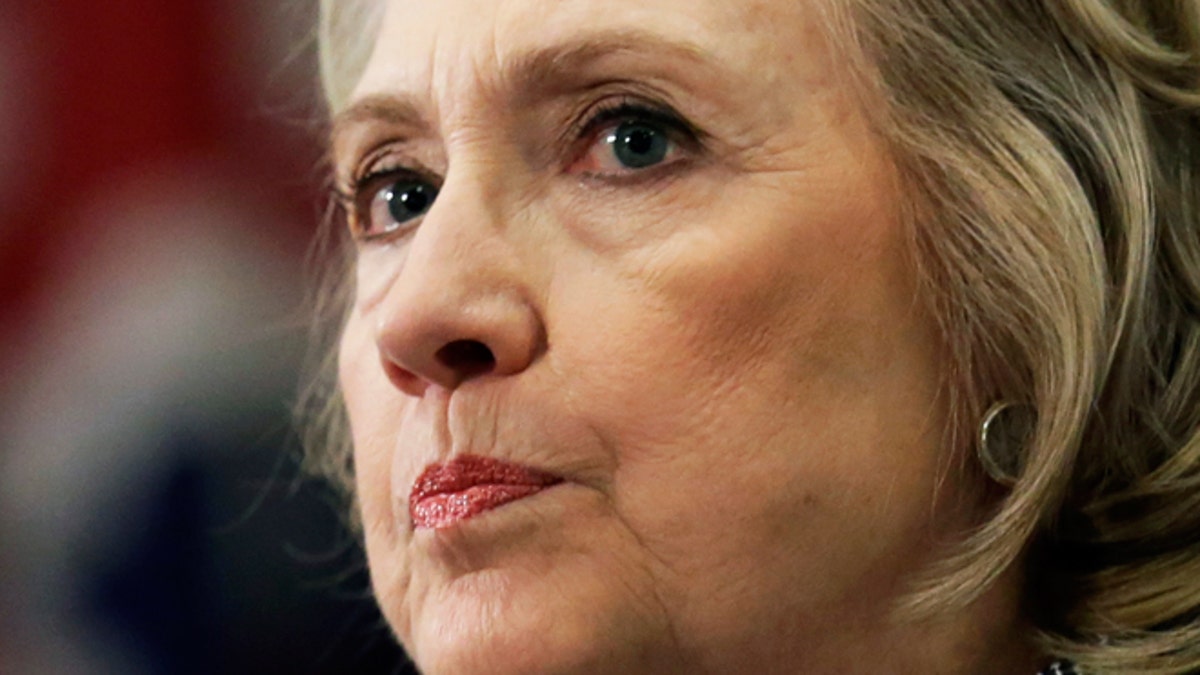
March 10, 2015: Hillary Rodham Clinton answers questions at a news conference at the United Nations. Clinton conceded that she should have used a government email to conduct business as secretary of state, saying her decision was simply a matter of "convenience." (AP Photo/Richard Drew)
After a week of stonewalling, Hillary Clinton hijacked a United Nations conference room Tuesday to hold a 20 minute news conference on her use of a private email account to conduct government business while Secretary of State.
We have learned from Hillary Clinton’s role in Travelgate, Filegate, Whitewater, and numerous other scandals that she clearly blurs the lines between what is public information and what is private, constantly deciding against disclosure and transparency.
Her spokesman called on handpicked reporters, ignoring everyone else. Her appearance created far more questions than answers, leaving behind an impression of slippery evasions. In other words, "The Clinton Show" from the 1990s is back with new episodes.
We have learned from Hillary Clinton’s role in Travelgate, Filegate, Whitewater, and numerous other scandals that she clearly blurs the lines between what is public information and what is private, constantly deciding against disclosure and transparency.
Hillary’s defense, of the kind of private email account that she used to blast some George W. Bush aides for having, was simple:
1. She used a private address so she didn’t have to carry two phones. But that excuse is belied by the fact that just last month she told an interviewer she owns “an iPad, a mini iPad, an iPhone and a Blackberry.”
2. She didn’t email anyone about any classified information and only exchanged emails with a single foreign official, someone from Britain she wouldn’t identify. But are we to take her statement at face value? This from the person who dodged numerous subpoenas for years during her years as first lady. An FBI report concluded that documents sought in the Whitewater investigation had been found in the personal White House quarters of the Clintons after going missing for two years. The first lady’s fingerprints were (literally) on them. As Rep. Darrell Issa, R-Calif., the former chairman of the House Government Reform and Oversight Committee notes:
"This matter cannot be put to rest without a thorough forensic examination of the email server and an unbiased independent review of the records in question.”
3. She deleted all her personal emails before forwarding her correspondence to the State Department. Since her personal emails make up over half of the 60,000 or so she sent out, it’s important to determine just what was personal and what wasn’t. Clinton didn’t provide an answer.
Throughout the controversy about her emails, Hillary Clinton’s office has claimed they have responded “right away” to requests for them. But State Department officials tell a difference story, one in which their agency was asked to to comply with a request from a special House committee investigating the 2012 attacks in Benghazi. That request came last October. It took lengthy negotiations and over two months before Secretary Clinton was forced to turn over some of her emails.
After reviewing which emails to send to State, Clinton said she deleted personal correspondence. "I chose not to keep my private, personal emails -- emails about planning Chelsea's wedding or my mother's funeral arrangements, condolence notes to friends, as well as yoga routines, family vacations—the other things you typically find in In boxes. No one wants their personal emails made public, and I think most people understand that and respect that privacy.”
Of course, they do. But we have learned from Hillary Clinton’s role in Travelgate, Filegate, Whitewater, and numerous other scandals that she clearly blurs the lines between what is public information and what is private, constantly deciding against disclosure and transparency.
Back in 2000, Independent Counsel Robert Ray wrapped up his report on the White House Travel Office scandal, in which the office’s employees were summarily fired for political reasons and its director, Billy Dale, was indicted for fraud. A jury acquitted him within minutes of what was later generally acknowledged were trumped-up charges. Ray’s report found that First Lady Hillary Clinton’s testimony to his office on the matter as “factually false.” but that "despite that falsity, no prosecution of Mrs. Clinton is warranted."
It is because of a long history of such incidents, that Hillary watchers and even some Democratic supporters are so reluctant to take her at her word. As with so much about the Clintons, the watchword might be: “Distrust, and then verify.”
